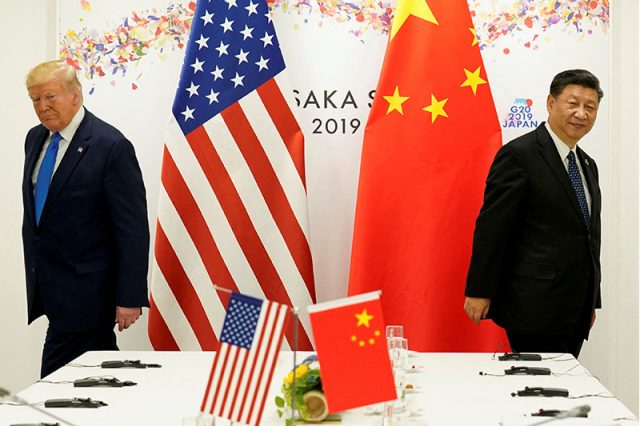
HONG KONG/BEIJING — U.S. President-elect Donald Trump inherits a United States-China relationship reset by presidents Joe Biden and Xi Jinping over the last year to lift ties off a diplomatic nadir after COVID-19 and tension over Taiwan.
Formal talks are being held on a range of critical issues, but regional diplomats and analysts say these channels key to manage tense ties could be on the chopping block with Trump in the White House. They include:
Defense
Improved communications between the two militaries have helped check tension in regional hotspots as Chinese and Philippine coast guard and fishing vessels square off almost weekly in the disputed South China Sea while the Chinese airforce keeps up tests of Taiwan’s defenses with combat readiness patrols close to the island.
More work lies ahead to make them durable amid China’s military modernization and U.S. deployments that ensure its traditional dominance of the Asian theatre, analysts say.
Some fear military ties could be the first to be jettisoned if there is fresh turbulence, pointing to the military chill lasting nearly two years after then-House Speaker Nancy Pelosi visited Taiwan in August 2022.
Communications have gradually improved on a number of defence fronts since Xi and Biden agreed to deepen relations when they met face-to-face in November 2023.
Biden’s national security adviser, Jake Sullivan, held a rare meeting with Xi’s key military adviser, Zhang Youxia, during three days of talks in Beijing in August. He has also held frequent intensive meetings with its top diplomat, Wang Yi.
The first talks between theatre-level commanders in September reflected a long U.S. push to stabilize military ties and ease misunderstanding amid broader regional tension.
Some analysts say the U.S. Indo-Pacific Command in Hawaii is likely to maintain deployments at current levels but short-term uncertainty over Trump’s approach would be keenly felt by both Chinese leaders and military commanders.
“In this scenario, I would expect the military leadership to be much more on edge in their deployments surrounding flashpoints such as the Taiwan Strait, the South China Sea and disputed areas with Japan,” said Singapore-based security analyst Alexander Neill.
“The leadership does not like unpredictability,” added Neill, a fellow at Hawaii’s Pacific Forum.
Shelved talks on China’s growing nuclear weapons program will be another area of likely scrutiny in coming months, with the Biden team keen for progress but Beijing reticent.
Some analysts say Beijing, with an arsenal far smaller than both those of the United States and Russia, sees little upside in such talks.
“It is very telling that even during this current mild thaw between Washington and Beijing, Beijing still switched off arms control conversations with Washington earlier this year,” said Jon Czin, a foreign policy specialist at the Brookings Institution.
ALSO READ: What Trump’s victory means for Ukraine, the Middle East, China and the rest of the world | US election: What a Trump victory would mean for the rest of the world
Fentanyl
There has been incremental but visible progress in cooperation over shutting down illicit traffic in chemicals used to produce deadly fentanyl after Xi and Biden agreed to resume joint efforts at the November 23 meet.
The United States, where fentanyl abuse has been a major cause of death, has pushed China for tougher law enforcement, including tackling illicit finance and clamping further controls on the chemicals.
In June, China’s top prosecutor urged its law enforcement officials to focus on combating drug trafficking, as Beijing and Washington unveiled a rare joint investigation into drugs.
In August, days after a meeting of a joint counternarcotics working group, China said it would tighten controls on three chemicals essential for making fentanyl.
Climate change
Climate diplomacy between the world’s top two greenhouse gas emissions helped build momentum for global pacts such as the Paris Agreement and played a key role in building consensus at last year’s COP28 meeting in Dubai.
With Trump expected to pull out of the Paris accord for a second time, the two countries’ cooperation on climate issues will come to an end, though subnational initiatives with the state of California and others are expected to continue.
Trump’s imminent return to the White House could also undermine efforts to persuade China to adopt more ambitious 2035 emissions-cutting targets, with Beijing already irked by U.S. “green trade barriers” on electric vehicles, batteries and solar panels.
Economics
Less visibly, the two rivals hold regular meetings of working groups on economic and financial issues launched in September 2023.
At one such meeting over two days in Beijing in September, Chinese officials expressed “grave” concerns about additional U.S. tariffs, investment restrictions, and Russia-related sanctions.
The broader dialogue effort is important and yielded “meaningful progress”, said Zhao Mingzhao, of Fudan University’s Institute of International Studies.
“But for Beijing, there is legitimate concern over these dialogues that, in a Trump presidency, could be halted, could be stopped again,” he added.
— Additional reporting by Antoni Slodkowski and Laurie Chen in Beijing and David Stanway in Singapore; Editing by Antoni Slodkowski and Clarence Fernandez









